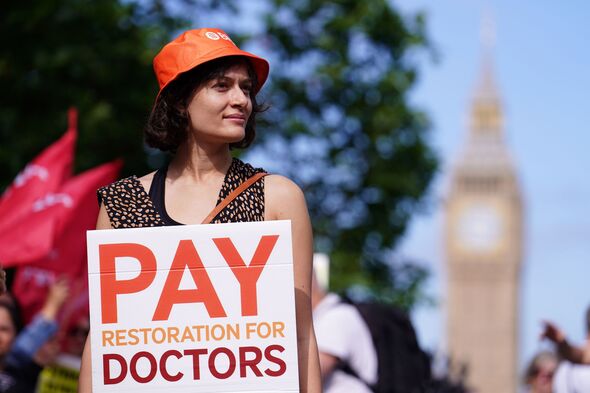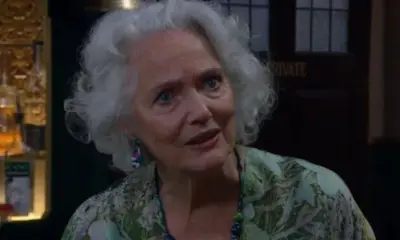Politics
NHS Strikes Threaten Patient Care as Health Secretary Faces Criticism

Health Secretary Wes Streeting has come under fire as the National Health Service (NHS) faces a new wave of strikes from healthcare professionals. Nurses, doctors, and other health workers are preparing for potential walkouts over pay disputes and reforms outlined in the Government’s 10 Year Health Plan, announced last month. This escalation follows a five-day strike by resident doctors in February 2025, raising concerns about the impact on patient care.
The criticism intensified when Stuart Andrew, Shadow Secretary of State for Health and Social Care, accused the Government of “enabling chaos” within the NHS. He stated, “When doctors abandon the frontline for the picket line, it is a direct threat to patient care.” Andrew further claimed that the Government’s decision to grant significant pay rises without securing corresponding reforms has only encouraged union militancy. He highlighted that the Government’s new employment rights laws could lead to increased strike actions by removing the requirement for 50% of eligible union members to participate in strike ballots for them to be considered valid.
In a bid to address the ongoing labour disputes, the Labour government had introduced substantial pay increases in the public sector following their victory in the previous year’s elections. Notably, doctors and dentists received a 6 percent pay rise, while senior NHS managers saw their salaries increase by 5 percent. Resident doctors, in particular, were awarded raises of approximately 22 percent over two years. Despite these increases, the Royal College of Nursing (RCN) has warned that its members will participate in a ballot for industrial action if the Government does not reach an agreement on pay, particularly after a proposed 3.6 percent pay increase for 2025/26 was rejected by the membership in England.
The British Medical Association has also expressed concerns, indicating that family GPs could initiate a “future dispute” unless reassurances are provided regarding their pay and roles in new neighbourhood health hubs introduced under the Government’s health strategy. Furthermore, a recent ballot conducted by Unite revealed that 89 percent of NHS members rejected the 3.6 percent pay offer, with 95 percent indicating their willingness to take industrial action against perceived cuts to the NHS.
In response to the escalating situation, a spokesperson from the Department for Health stated, “We are working hard to fix the NHS and we are starting to turn the tide.” They highlighted that waiting lists are at their lowest in two years and that satisfaction with general practitioners is on the rise. The spokesperson noted that 4.6 million appointments have been delivered in the first year of the health plan, asserting that the Government is committed to addressing the concerns of healthcare workers, including pay structure reform and career progression.
As tensions rise, the looming threat of strikes poses a significant challenge to the NHS, with the potential to disrupt services and impact patient care. The situation remains fluid, with both sides urged to engage in constructive dialogue to avert further industrial action.
-

 Entertainment2 weeks ago
Entertainment2 weeks agoLove Island Star Toni Laite’s Mother Expresses Disappointment Over Coupling Decision
-

 Entertainment2 weeks ago
Entertainment2 weeks agoWoman Transforms Life with Boot Camp, Losing Nearly 9 Pounds in a Week
-

 Lifestyle3 weeks ago
Lifestyle3 weeks agoBring Birds to Events and Dine with Style: Trends This Week
-

 World3 weeks ago
World3 weeks agoCoronation Street Recasts Lily Platt Amid Dramatic Storyline
-

 Entertainment1 week ago
Entertainment1 week agoMary Goskirk’s Injury Raises Questions in Emmerdale Episode
-

 Sports3 weeks ago
Sports3 weeks agoGAA Faces Controversial Decision on DJ Carey Before Final
-

 Entertainment3 weeks ago
Entertainment3 weeks agoBob Vylan Drops Out of European Tour with Gogol Bordello After Controversy
-

 Lifestyle3 weeks ago
Lifestyle3 weeks agoAylesbury Committee Approves Controversial 24-Hour McDonald’s
-

 Entertainment3 weeks ago
Entertainment3 weeks agoJessica Alba’s New Relationship Unveiled with Younger Actor
-

 Entertainment3 weeks ago
Entertainment3 weeks agoKeeley Hawes Takes Risks in High-Octane New Series The Assassin
-

 World3 weeks ago
World3 weeks agoBritish Man, 26, in Critical Condition After 22ft Fall in Ibiza
-

 Top Stories2 weeks ago
Top Stories2 weeks agoNicki Minaj and SZA Engage in Heated Social Media Feud









